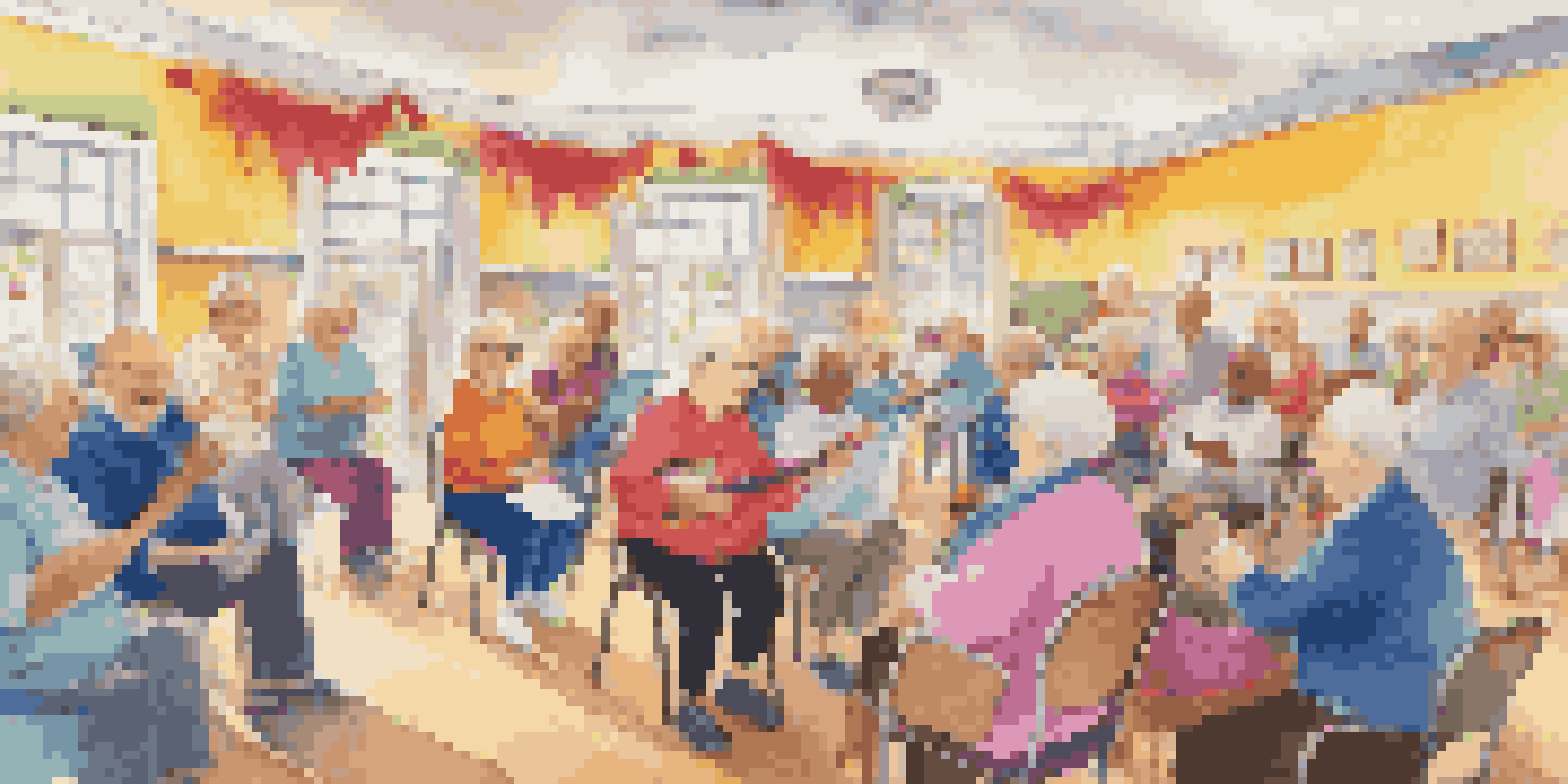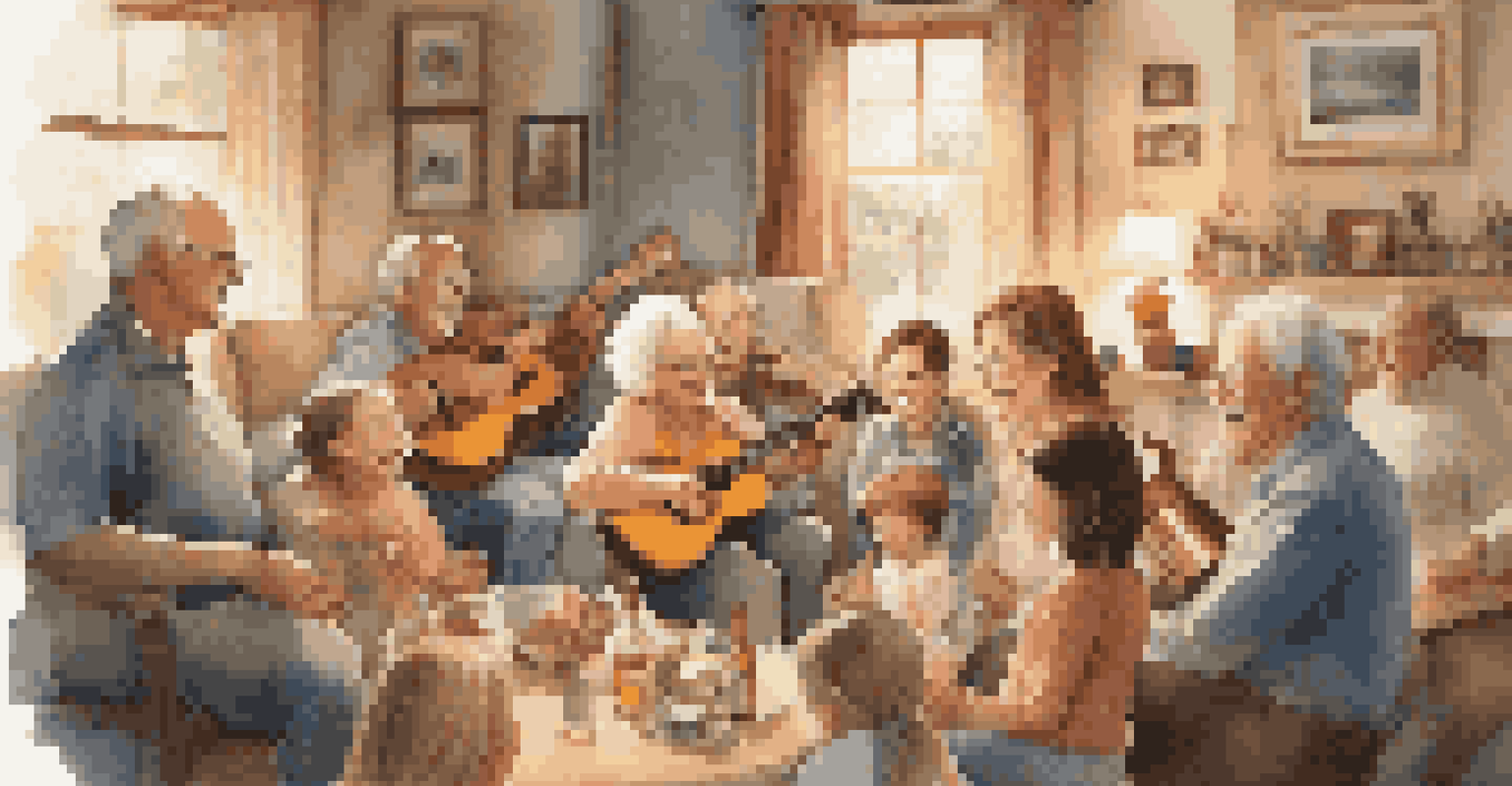The Influence of Music on Seniors' Social Engagement

Understanding Music's Role in Emotional Well-Being
Music has a profound ability to evoke emotions, and this is especially true for seniors. Many older adults associate certain songs with memories, which can stimulate feelings of joy or nostalgia. When seniors engage with music, they often share these experiences, creating an emotional connection with others.
Music can change the world because it can change people.
For instance, a familiar tune might remind a senior of their wedding day or a cherished family gathering. These memories can spark conversations, allowing seniors to reminisce and bond over shared experiences. This emotional engagement is crucial for combating feelings of loneliness and isolation.
Ultimately, music serves as a powerful tool for emotional expression, enabling seniors to connect with their past and present. By tapping into these shared memories, music fosters a sense of community and belonging, enhancing their overall well-being.
Music as a Catalyst for Social Interaction
When seniors participate in music-related activities, such as sing-alongs or dance classes, they naturally engage with others. These social settings provide opportunities for interaction and collaboration, breaking down social barriers. Whether it's a group singing session or a musical game, the shared experience encourages seniors to communicate and connect.

Consider a community center hosting a weekly music night. Seniors come together to enjoy live performances, participate in karaoke, or even share their musical talents. Such events not only entertain but also strengthen friendships and create new ones through shared interests.
Music Enhances Emotional Well-Being
Engaging with music helps seniors evoke memories and fosters emotional connections, combating loneliness.
In this way, music acts as a bridge, linking individuals through rhythm and melody. This social engagement is vital for maintaining a vibrant and active lifestyle, promoting both mental and emotional health.
The Science Behind Music and Memory Activation
Research indicates that music can significantly enhance memory recall, especially in seniors. The brain processes music in a unique way, activating different areas responsible for memory and emotion. This phenomenon can be particularly beneficial for those dealing with cognitive decline or dementia.
Where words fail, music speaks.
For example, a familiar song might help a senior recall specific events or people from their past. When reminiscence is triggered by music, it often leads to discussions with peers about those memories. This interaction not only improves cognitive function but also enriches social bonds.
Thus, incorporating music into the lives of seniors can aid in memory retention while simultaneously fostering social interaction. It's a win-win, promoting mental acuity and enhancing social engagement.
Creating Inclusive Music Programs for Seniors
To maximize the benefits of music, communities should develop inclusive programs tailored to seniors. This could include music therapy, group classes, or even informal gatherings centered around music appreciation. The key is to create an environment where seniors feel comfortable exploring their musical interests.
For instance, a local nursing home might organize weekly music therapy sessions led by a trained professional. These sessions can cater to various musical tastes and abilities, ensuring that every participant feels included. By fostering an accepting space, seniors can share their love for music without fear of judgment.
Music Promotes Social Interaction
Participating in music activities encourages seniors to connect with others, strengthening friendships and community bonds.
Such programs not only encourage participation but also promote a sense of belonging among seniors. When music becomes a communal activity, it strengthens social ties and enhances overall quality of life.
The Power of Music in Reducing Loneliness
Loneliness is a significant issue among seniors, often leading to feelings of depression and isolation. Music can play a vital role in alleviating these feelings by providing a sense of companionship. Listening to or performing music can create a comforting atmosphere that helps seniors feel connected, even when physically alone.
For example, a senior might find solace in a favorite playlist while reminiscing about fond memories. This act can evoke feelings of joy that counteract loneliness. Additionally, participating in group music activities can help seniors forge new friendships, combating isolation.
By integrating music into daily routines, seniors can experience a boost in mood and a decrease in feelings of loneliness. It’s a simple yet effective way to enhance their social well-being.
Engaging Families Through Music Activities
Music not only benefits seniors but also offers a wonderful way to engage their families. When families participate in music-related activities, it strengthens intergenerational bonds. This could involve singing together, playing instruments, or even attending concerts, creating shared experiences that everyone can cherish.
Imagine a family gathering where everyone brings their favorite songs to share. This not only sparks conversations about musical preferences but also allows seniors to impart their musical knowledge to younger generations. Such interactions can foster mutual respect and understanding, bridging the age gap.
Music Aids Memory Recall
Research shows that music can enhance memory recall for seniors, supporting cognitive function and enriching social interactions.
Through music, families can connect on a deeper level, creating lasting memories and strengthening relationships. Engaging in these activities together enriches the family dynamic and enhances the overall sense of community.
The Future of Music in Senior Care
As we look ahead, the role of music in senior care will likely expand and evolve. With advancements in technology, we can expect to see more personalized music experiences tailored to individual preferences. From music streaming services to virtual reality concerts, the possibilities are endless.
Moreover, healthcare providers are increasingly recognizing the therapeutic benefits of music. Integrating music into care plans can enhance the quality of life for seniors, promoting emotional and social well-being. This trend indicates a growing commitment to holistic approaches in senior care.

Ultimately, as we continue to explore the influence of music on seniors, we can expect to see more innovative solutions that foster engagement and connection. By embracing music, we pave the way for a brighter future in senior social engagement.